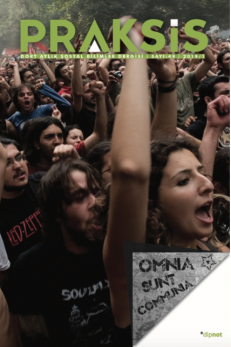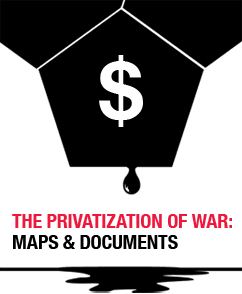Artikel
Interview with Dario Azzellini

Welcome to the radio magazine that brings you news, commentary and analysis from a Black Left perspective. I’m Glen Ford, along with my co-host Nellie Bailey. Coming up: Much of what you read in the corporate media is pure propanganda, a fictionalized account of the world. Margaret Kimberley and other reporters unmasked these lies before a packed crowd in New York City; we’ll get a report on the racial dimensions of the struggle for socialism in Venezuela; and, activists say “F” the police and their brutal presence in the New York subway system. (…)
Der Neoliberalismus ist in Lateinamerika nicht oder nur mit enormer Gewalt durchzusetzen. Das ist ein Schuss vor den Bug der Eliten
Ende der rechten Einheitsfront ‒ Wie die aktuellen Aufstände Lateinamerika verändern
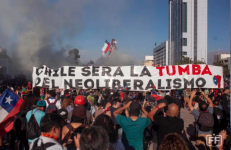
Proteste, Aufstände und Regierungswechsel in Lateinamerika und der Karibik: In Ecuador hat eine Revolte gegen die IWF-Politik die Regierung vorerst zum Einlenken gezwungen. In Haiti tobt ein Aufstand gegen die US-gestützte Regierung. In Chile protestieren und streiken Millionen für ein Ende der neoliberalen Politik, den Rücktritt des rechten Präsidenten und Milliardärs Sebastián Piñera und eine neue Verfassung. Honduras und Panama erleben ebenfalls Massenproteste.
INTERVIEW
BAR Book Forum: Dario Azzellini’s “Communes and Workers' Control in Venezuela”
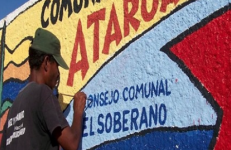
Millions of Venezuelans are building socialism from below, and most of them are Black, brown and female.
“The mainstream media, and even many people considering themselves leftists, cannot understand why the Maduro government is still in power.”
In this series, we ask acclaimed authors to answer five questions about their book. This week’s featured author is Dario Azzellini . Azzellini is a visiting fellow at the Latin American Studies Program, Cornell University. His book is Communes and Workers' Control in Venezuela: Building 21st Century Socialism from Below.
Dario Azzellini in: Reclaim Democracy. Die Demokratie Stärken und Weiterentwickeln
Selbstverwaltung und Arbeiter*innenkontrolle: Wenn die Demokratie nicht am Werkstor aufhört
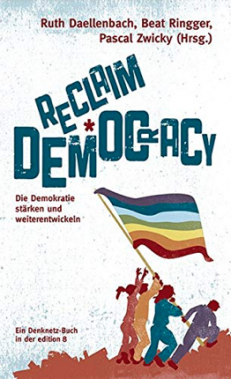
"Ein grundlegendes Merkmal der liberalen Demokratie ist, dass demokratische Entscheidungsfindung aus den meisten Bereichen des Lebens aus- geschlossen bleibt. Liberalismus und Demokratie galten über Jahrhunderte hinweg als unvereinbare Gegensätze. Erst die Beschränkung der Demokratie auf die politische Sphäre machte sie für Liberale akzeptabel und führte zur Entstehung der liberalen Demokratie. Damit ist ein für die meisten Menschen zentraler und prägender Bereich des Lebens, die Arbeit, von der demokratischen Entscheidungsfindung ausgeschlossen.
"Nosotros, sus amigos en el extranjero haremos lo que sea necesario para apoyarlo con todos los medios y a través de todos los canales diplomáticos disponibles para nosotros".
Académicos se pronuncian sobre Rojava: "¡Se trata de la humanidad, nunca se rindan!"

Mientras continúa la guerra de agresión turca contra Rojava y el noreste de Siria, hay protestas contra ella en todo el mundo. Los intelectuales y académicos se pronuncian y condenan esta guerra y muestran solidaridad con Rojava y el noreste de Siria.
A continuación, publicamos declaraciones del Prof. Noam Chomsky, Prof. Federica Giardini, Dr. Dario Azzellini, Dr. Joost Jongerden, Prof. Kariane Westrheim y Prof. Ueli Mäder que expresaron su solidaridad.
Prof. Noam Chomsky, lingüista, filósofo e historiador, EE. UU.:
"We, your friends abroad will do whatever it takes to support you with all means and through every diplomatic channel available to us."
Academics for Rojava: "It's about humanity, never give up!”

While the Turkish war of aggression against Rojava and North-East Syria continues, there are protests against it worldwide. Intellectuals and academics speak out and condemn this war and show solidarity with Rojava and Northeast Syria.
In the following, we publish statements of Prof. Noam Chomsky, Prof. Federica Giardini, Dr. Dario Azzellini, Dr. Joost Jongerden, Prof. Kariane Westrheim and Prof. Ueli Mäder who expressed their solidarity.
Prof. Noam Chomsky, linguist, philosopher and historian, USA:
“Hard to convey how wrenching all of this is.
Digitalization and marketization in live music
Limits of the platform economy
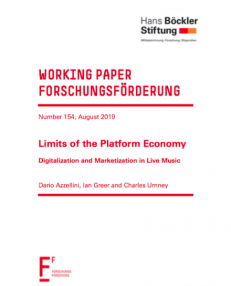
Online platforms have disrupted parts of the capitalist economy, with allegedly severe consequences in the world of work. This study examines live music in Germany and the UK, where online platforms do not dominate, despite considerable digitalization of market intermediaries. The analysis shows that, as the degree of digitalization increases, matching services tend to work less as a workers representative which is traditionally the case for live music agents and more as a force of marketization that disciplines workers by orchestrating price-based competition.
La révolution bolivarienne peutelle survivre à la crise au Venezuela?
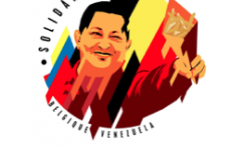
Une des réalisations les plus importantes du gouvernement chaviste du Venezuela a peut-être été de créer un espace dans lequel la Révolution Bolivarienne a pu s’épanouir. Mais cette révolution peut-elle survivre à la crise actuelle?
Can the Bolivarian revolution survive the Venezuelan crisis?
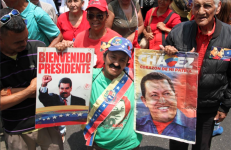
Creating the space for and allowing the Bolivarian Revolution to flourish is perhaps the most important achievement of Venezuela’s Chavista government — but can it survive the current crisis?
Interview
Dr. Dario Azzellini: Bridging the gap between academica, activism & filmmaking
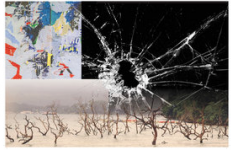
“How do you neutralize a revolutionary?... you give him an office with air conditioning.” This was one of several humorous anecdotes that Dr. Azzellini shared with me during our interview. Dr. Azzellini’s eyes twinkled with amusement as he recounted this joke someone once told him. His incisive and dynamic way of thinking and conceptualizing ideas and connections increasingly became evident during our interview.
Interview mit Dario Azzellini:
VENEZUELA »Wir haben es mit einer ganz klassischen, imperialistischen Regime-Change-Politik zu tun«
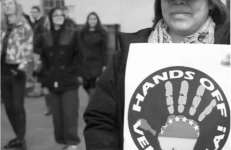
Der Politikwissenschafter DARIO AZZELLINI hat mehrere Bücher über die politischen Entwicklungen in Venezuela veröffentlicht. Schwerpunkt seiner Forschung sind Prozesse sozialer Transformation. Er ist Gründungsmitglied des 2011 gegründeten Internetarchivs workerscontrol.net, das Texte zum Thema ArbeiterInnenselbstverwaltung sammelt. Für die Volksstimme hat RAINER HACKAUF mit Azzellini über die aktuelle Lage in Venezuela gesprochen.
Der Putschversuch gegen den amtierenden Präsidenten Nicolás Maduro scheint ins Stocken geraten. Ein falscher Eindruck?
Interview mit Dario Azzellini
Venezuela: „Es ist Falsch, von Hilfslieferungen zu reden“
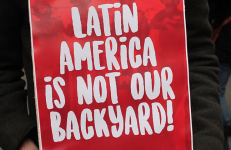
In Venezuela geht es nicht um Hilfslieferungen und Demokratie, sondern darum, dass die US-Regierung ihren Hinterhof wieder unter Kontrolle bringen möchte. Ein Interview mit Dario Azzellini
marx21: Im Moment spielt der Streit um Hilfslieferungen in der Berichterstattung die Hauptrolle. Es ist von Hunger die Rede, von fehlenden Medikamenten. Wie ist die Versorgungslage in Venezuela?
Golpe en curso en Venezuela
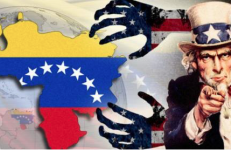
En Venezuela hay un intento de golpe respaldado por Estados Unidos en pleno desarrollo. El 23 de enero, el político opositor hasta ahora desconocido, Juan Guaidó (que asumió sólo el 5 de enero de 2019 como presidente de la Asamblea Nacional declarada ilegal por el tribunal supremo de Venezuela) se autoproclamó presidente de Venezuela. Lo hizo alentado por el gobierno de los Estados Unidos. El golpe se preparó en conversaciones secretas en presencia de representantes del gobierno colombiano en los EEUU.
Gespräch mit Dario Azzellini
Die Zukunft Venezuelas

Neben Deutschland haben mehrere EU-Länder Oppositionsführer Guaidó als Übergangspräsidenten Venezuelas anerkannt - und damit den Druck auf Staatschef Maduro erhöht.
Allerdings sollte man die Fordungen nach einer demokratischen Veränderung der Situation in Venezuela nicht so wörtlich nehmen: Das Zeil ist eindeutig der Sturz des venezuelanischen Präsidenten Nicola Maduros. Und wenns sein muss, mit militärischen Mitteln.
Soweit Dario Azzellini Einschätzung zu den Geschehnissen um Venezuela
Zur Lage in Venezuela - Gespräch mit Dario Azzellini

Am 23.1. rief sich der Oppositionspoliter Guaidó zum Präsidenten Venezuelas aus. Die Anerkennung durch die USA folgte umgehend, später zog unter anderem Deutschland nach. coloRadio bat den Politikwissenschaftler und Publizisten Dario Azzelini um eine Einschätzung zu den Vorgängen. Er hat sich unter anderem mit Basisinitiativen und Selbstverwaltung in Venezuela beschäftigt und kennt daher Land und Leute. Zuerst wollten wir wissen, wie er die Lage mit den beiden konkurrierenden Präsidenten einschätzt.
AutorInnen: MoMa
Bilder: Janis Garnet / Berlin Feb. 2019
und wie weiter?
Putschversuch in Venezuela
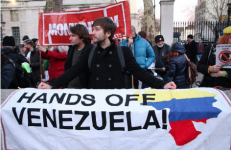
In Venezuela ist ein von den USA unterstützter Putschversuch im vollen Gange. Am 23. Januar ernannte sich der bis dato weitgehend unbekannte Oppositionspolitiker Juan Guaidó und erst seit dem 5. Januar 2019 Vorsitzender der Nationalversammlung selbst zum Präsidenten Venezuelas. Dabei wurde er offenbar von der US-Regierung ermuntert. Der Putsch wurde in Geheimgesprächen in Anwesenheit Gesandter der kolumbianischen Regierung in den USA vorbereitet. Auf die Selbsternennung Guaidó erfolgte die sofortige Anerkennung durch die US- und die kanadische Regierung.
Why haven’t platforms taken over live music?
The limits of the “platform economy”

It is often assumed that the “platform economy” is in the ascendancy, and is taking over more and more economic sectors. Because of this, much research on the matter has focused on characterising and evaluating this change: what are the relative advantages and disadvantages of this kind of work compared to more “traditional” jobs? Should we be optimistic or pessimistic about it? Hence, most current research has looked at the experience of workers in industries which are already highly “platformised” (such as ride sharing, food delivery, or clickwork).
Dario Azzellini en: La metrópolis creativa: innovación social y espacios de resistencia en el Sur de Europa y América Latina
¡Ocupar, resistir, producir! La crisis actual y las recuperaciones de empresas recuperadas por sus trabajadores en Europa
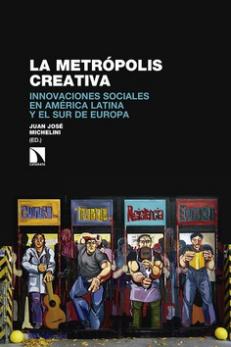
A lo largo de las dos últimas décadas la noción de innovación social ha venido adquiriendo un creciente interés en relación con el desarrollo urbano, interés que parece haberse afirmado en el contexto de la crisis desatada en 2007 y su impacto en términos de pobreza, vulnerabilidad, exclusión social y desigualdad. Refleja, además, la necesidad de poner en marcha dinámicas de cambio social capaces de confrontar, e incluso revertir, las crisis sistémicas periódicas y sus principales consecuencias.
Activistas y estudiosos responden a una pregunta que se hace la izquierda en todo el mundo
¿Cómo se manifiesta la lucha de clases en el siglo XXI?
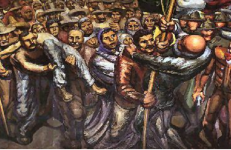
Dario azzellini, Profesor del Departamento de Sociología del Desarrollo, Universidad de Cornell (Ithaca). Su publicación más recientes es Luchas obreras en el siglo XXI (Brill / Haymarket, 2018)
Räte, Arbeiterkontrolle und Selbstverwaltung am Arbeitsplatz
Wir können auch anders
Die Forderung nach Wirtschaftsdemokratie war eine Initiative der Arbeiter- und Gewerkschaftsbewegung in den 1920er Jahren. In der Bundesrepublik wurde dieser Impuls vor allem in die unterschiedlichen Formen der Mitbestimmung in der verarbeitenden Industrie umgesetzt. Daneben gibt es die Praktiken der Genossenschaften, der Kooperativen und der Selbstverwaltung.
Talk at the Asia-Europe People’s Forum and transform! conference "Our Common Social Future," Barcelona, June 8-10, 2018 - 10 juni 2018
Commons and Conflict
Today, everyone is speaking about commons and ‘commoning’, everyone wants to build commons. The World Bank has a group which is supposedly ‘protecting and improving the global commons’ and it reaches out to the private sector to ‘advance common goods’. You can find texts on commons on the website of the European Union, banks organize seminars on the commons. Transnational companies tell us they are building the commons, big magazines declare that Uber is commoning cars, and that the “sharing economy” is a form of commoning.
Interview with Dario Azzellini
Yes We Can: Worker-Owned Coops
Founded in 1973, (yes, that’s 45 years ago!) the Park Slope Food Coop is one of the oldest and largest consumer food coops in the country. It’s a presence in our lives, the source of our food, and a center for community engagement. And it’s also part of a larger coop movement that stretches back in time and exists in many parts of the world.
One Question in On State of Nature Blog
What does class struggle mean today?
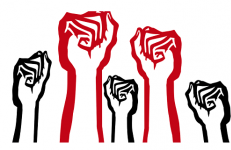
What does class struggle mean today?
Class struggle, that is, the struggle between labour and capital, is not at all a concept that belongs to the past. In a world of growing inequality, it is a reality more pertinent than ever. A recent study has revealed that since 2008 the wealth of the richest 1% has been growing at an average of 6% a year, while the wealth of the remaining 99% of the world’s population has been growing by only 3%. By 2030, the world’s richest 1% will control nearly two-thirds of the world’s wealth.
Entrevista a Darío Azzellini
“La guerra ha llegado a ser la forma de hacer economía y no la interrupción de la economía”
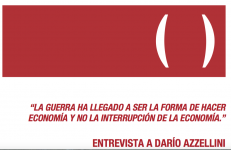
Quisiera comenzar la entrevista con algunas referencias relativas a su formación y a su trayectoria intelectual.
Dario Azzellini in: Council Democracy. Towards a Democratic Socialist Politics
"The Legacy of Workers’ Councils in Contemporary Social Movements"
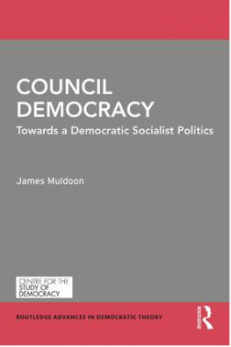
„The return to public assemblies and direct democratic methods in the wave of the global "squares movements" since 2011 has rejuvenated interest in forms of council organisation and action. The European council movements, which developed in the immediate post-First World War era, were the most impressive of a number of attempts to develop workers’ councils throughout the twentieth century. However, in spite of the recent challenges to liberal democracy, the question of council democracy has so far been neglected within democratic theory.
A könyv előszava „They Can’t Represent Us! Reinventing Democracy from Greece to Occupy“
David Harvey: Ők nem képviselhetnek bennünket
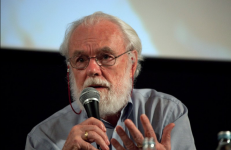
David Harvey 2014-es Ők nem képviselhetnek bennünket c. cikkében amellett érvel, hogy a kapitalizmus nyerteseit rá kell kényszeríteni, hogy megfizessék a környezetre és a társadalomra mért károkat. Világszintű mozgalom-viziójának fontos pillére a tüntetés mint eszköz a civilek kezében.
Eredetileg megjelent előszóként Marina Sitrin és Dario Azzellini: They Can’t Represent Us! Reinventing Democracy from Greece to Occupy. (Ők nem képviselhetnek bennünket! A demokrácia újra-feltalálása Görögországtól az ‘Occupy’ mozgalomig.) London–New York: Verso, 2014.
Book Review
Living on the Margins: Undocumented Migrants in a Global City by Alice Bloch and Sonia McKay
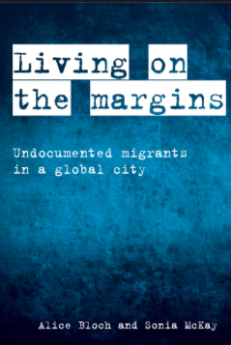
"The book offers interesting insight into the everyday life of undocumented migrants without portraying them as helpless victims. Ample quotations from the interviews underline their agency and the complex and contradictory conditions they experience in the ethnic enclaves they are forced to rely on. Bloch and McKay shed light on the circumstances, motivations, and conditions of ethnic enclave employers, who, in most of the literature on undocumented migration, are not a subject of research.
Dario Azzellini ile röportaj
İŞÇİ KONSEYLERİNDEN GÜNÜMÜZ KÜBA KOOPERATİÇİLİĞİNE: Konuş Kolektif Hafıza
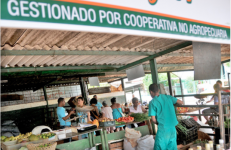
“Beşik dipsiz uçurumun üzerinde sallanıyor ve sağduyu bize varlığın iki karanlık ebediyet içinde anlık bir ışık kırılmasından ibaret olduğunu söylüyor” diyor Nabokov. Ama bir de kolektif hafıza var. Paul Fraisse’den aktaralım: “Hiçbir zaman yalnız değiliz... En şahsi hatıralarımız bile içinde yaşadığımız topluluğa sıkı sıkıya bağlı”. İşte şimdi o kolektif hafızaya kulak veriyoruz. Dario Azzellini’ye bağlanıp 1956 Macaristan ayaklanmasından başlayıp güncel Küba kooperatifçilik hareketine uzanan işçi kolektiflerini dinliyoruz.
Radio Corax: interview mit Dario Azzellini
Wer die Wahl und Maduro disqualifiziert, versteht Venezuela nicht
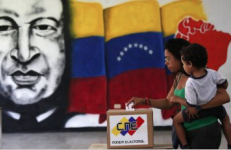
Ende Mai wurde in Venezuela Nicolas Maduro erneut zum Präsidenten gewählt. Die internationalen Reaktionen auf das Ergebnis waren unterschiedlich. Während einige Länder, unter anderem Kuba gratulierten, hat der US-Außenminister Mike Pompeo die Wahl als Schwindel bezeichnet und Sanktionen angekündigt. In Europa und von der Lima-Gruppe wurden Stimmen laut, dass die Wahl undemokratisch abgelaufen sei. Eine andere Sicht auf die Wahl und die Situation in Venezuela hat der linke Sozialwissenschaftler Dario Azzellini.
